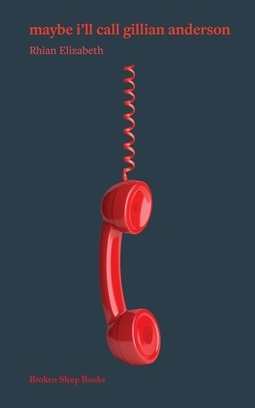Review of maybe i'll call gillian Anderson by Rhian Elizabeth, pub. Broken Sleep Books 2025

This is very much a themed collection; its genesis was empty nest syndrome resulting from the departure of a daughter to university, but as is generally the way, one emotional preoccupation leads on to others, memories of the mother’s own youth and past relationships. The words “mother” and “daughter”, though, remain central throughout.
The sense of the daughter’s absence is sharply evoked in poems like “the winter the murders stopped”:
i miss hearing the creak of my daughter’s bedframe
in the middle of the night, miss being summoned
for glasses of water she could easily
get herself, and now my house is filled
with spiders, since there is
no one here afraid of them
Memories of this daughter as a child
as soon as you could walk you had the inclination
to bolt and there was i, forever yanking you back
on your reins (“the bolter”)
mingle with memories of the narrator’s own childhood sleepwalking: “i was an escape artist in a pair of fluffy pink slippers.” (“escape artist”). Indeed escape, of a kind, is also central to the poems, in that many of the remembered or imagined relationships in the collection end in failed contact. The idyll of “drowning on a stranger’s couch”, in which two people seem to be fulfilling each other’s emotional needs, ends with
you will never
write the letter you vow you will write when you eventually
return home to wales a few weeks later, the
thank you to the stranger who misses
being a mother, from the girl who misses being a daughter.
And in “glasgow”, what looked like the start of a promising friendship also ends with the parties each going their own way:
on one of your days off you took the bus
into glasgow and brought me back a stuffed polar bear that i still have.
and then one morning,
some weeks after the bear,
i heard from one of the housekeepers
you’d caught that same bus
in the dead of night, rode out to some other hotel in some other country,
onto some other adventure. you left me alone
If this sounds despondent, that is not how the collection comes across, because there is quite a lot of wry humour in the voice, also a recognition that one cannot own people, nor keep them for ever – the daughter “is not lost, she is free” (“i didn’t call gillian Anderson”), and “the person next to me is not mine either, not really,/ because people never are, are they?” (escape artist”).
Some things about the poet’s technique will by now be evident; she doesn’t feel everything needs to be left-hand justified and is happy to use all the white space on the page, which is always rather a pleasure to me as a reader. And she works only in lower case, which some readers will not like so much, but it does seem to suit the conversational, informal tone of these poems. She also, at least in this collection, works mostly in the first person (occasionally in the second, when addressing the daughter). There are hazards in the “I” voice, notably the danger of sounding self-absorbed and sentimental. I think she mostly avoids this through the use of humour, though the last two lines of “the bolter” do strike me as not only predictable but a bit saccharine in tone. Mostly, though, she manages her endings well, making them memorable without looking contrived or sought-for. Indeed the last three lines of the last poem, which I won’t spoil by quoting, undercut the emotion of the collection in a way that raises a wry smile.



